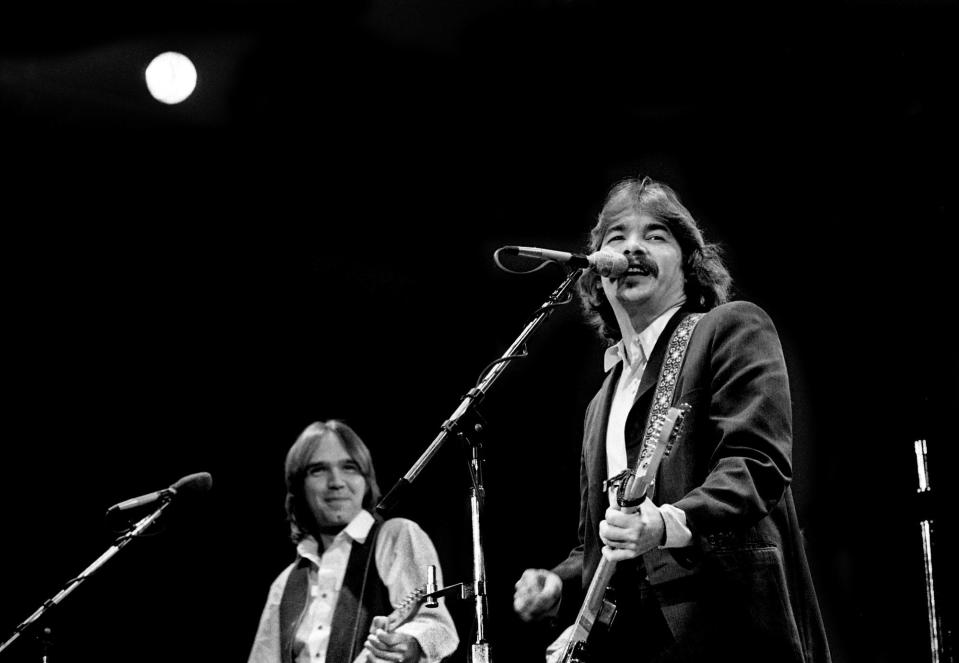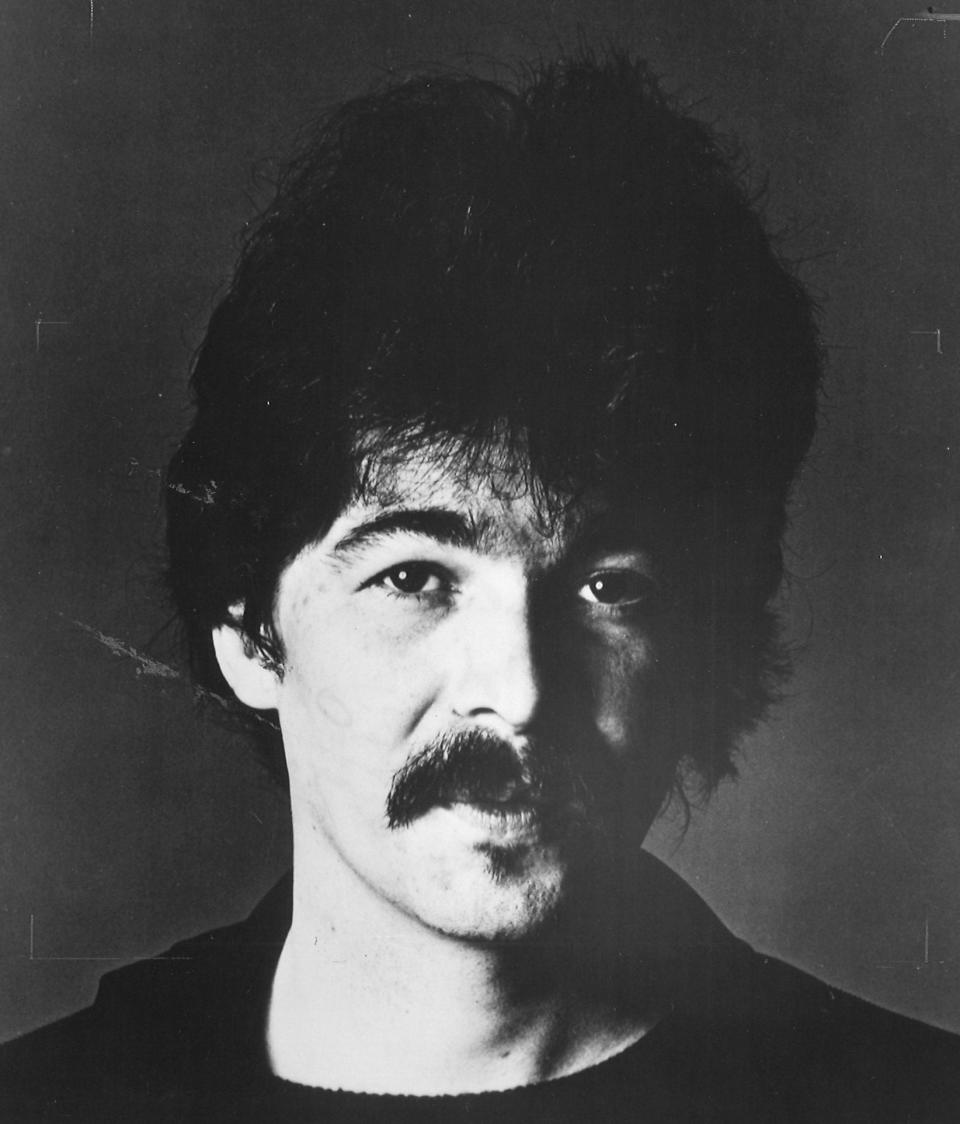From classic cars to pork loin: Getting to know John Prine in his own words
- Oops!Something went wrong.Please try again later.
- Oops!Something went wrong.Please try again later.
It's a mistake to presume the only way to experience John Prine is on 180-gram vinyl records. Column inches in car magazines and cookbooks also offer insight into one of the most quintessential singer-songwriters who ever lived.
In "Prine on Prine: Interviews and Encounters with John Prine," award-winning journalist Holly Gleason artfully unveils some of the magic behind the critically acclaimed singer-songwriter's ability to deliver uncommon poetry from the shared nature of the human experience.
New York Times bestselling author Gleason is an ideal journalist for compiling other journalists' thoughts about Prine in the latest chapter of the "Musicians In Their Own Words" series. The book comes out Sept. 12.

Her internationally renowned career initially intersected with Prine's as she was graduating from the University of Miami in 1985 and Prine was a year into boldly setting forth on his independent journey as the co-founder of eventual do-it-yourself powerhouse imprint Oh Boy Records.
Both Gleason and Prine are iconoclasts born in the suburban Midwest.
Prine was a native of the Chicago suburb of Maywood, Illinois, while Gleason's hometown of Shaker Heights, Ohio, borders Cleveland.
They're both fans of cheeseburgers, too.
Hence, Gleason opted to meet The Tennessean at Brown's Diner.
The nondescript watering hole, restaurant and juke joint near the campus of Belmont University was, before his sudden death from COVID-19 complications in April 2020, one of Prine's favorite Music City locales for eating cheeseburgers.
Pork roasts for German Afternoons
"John was a quietly brilliant and super-smart man with a genuine, honest heart," Gleason says.
She then dives into his love of food to best articulate how Prine's broad interests and fertile mind allowed his five-decade career to unfold.
Impressively, in that time, he wrote and performed generational anthems that bridged folk protest songs to Kris Kristofferson's outlaw country odes (his songs like Vietnam-era heartbreaker "Sam Stone" were so good they made Kristofferson say "we'll have to break his thumbs" about having him as a competitor), reconnected Sam Phillips and Jerry Wexler to the organic roots of rock 'n' roll, and then created the aesthetic, sound and raison d'etre for Americana to escape from country's conflation with Top-40 music at the turn of the 21st century.
"[John] was also the type of guy who loved making roast pork loin at home for his family and friends, but found four- and five-star dining to be as good as it was goofy and wonderful," Gleason says.

Prine's pork roast recipe — as borrowed from an except in Ronni Lundy's "Shuck Beans, Stack Cakes and Honest Fried Chicken: The Heart and Soul of Southern Country Kitchens" from 1991 — is in Gleason's compilation.
Entitled "Pork Roast for a German Afternoon," the name is an homage to Prine's 1986 album "German Afternoons."
Prine said the name referred to the type of day where "you go into town with some errands to run and stuff to do, but then you run into an old buddy you haven't seen. And you drop into a bar for just a minute and start to talk. And next thing you know, it's already evening and you've just spent a German afternoon."
The ability to enjoy that type of leisure — timeless in both a literal and figurative sense — is at the heart of the kind of dichotomy that, by 1981, country's mainstream did not have the breadth to accept within its Top-10 charts, where Prine had been diligently attempting to sustain himself as a darling of critics like Cameron Crowe, Roger Ebert and Studs Terkel.
There were 48 chart-topping country singles and 13 No. 1 country albums in 1981.
None were Prine's 1980 album "Storm Windows" or its five-minute-long title track.
The increase of adult contemporary, pop and soft rock influences on country's mainstream could be considered less rugged versions of Prine's creative influences.
Classic cars and procaine
Prine was a mailman whose confidence arrived via playing blues, country and folk songs with a swagger aimed at defining himself within the powerful archetypes of artists including Arthur Alexander, Hank Williams and artisans familiar within the then 150-year-long tradition of America's various fundamental songbooks.
In "Prine on Prine," Gleason includeds a 1982 Los Angeles Times interview between Prine and Robert Hillburn at the Country Music Association's disc jockey convention.
With inimitable confidence and a cool yet entirely devil-may-care demeanor, Prine made the following statement regarding what it would require for one of his independent — and organically country — records to break into the genre's mainstream.
“The next time they have one of these conventions here, I’m going to open up my booth. I’ll buy some procaine, which is what people often use to cut cocaine with. It’s legal and the disc jockeys that stop by the booth probably won’t know the difference. It looks just like cocaine. I’ll pour it out on a table and people’ll go wild. I’ll also hire a stripper to dance around and I’ll hand out cigars. Meanwhile, I’ll play my record and we’ll see who causes the biggest sensation around here.”
Gleason describes Prine as a "morally decent and lyrically dignified" writer whose respect for living within a moment superseded his desire to pull out his pen and start writing a song.

Once, after asking him the difference between writing happy and sad songs, Prine joked that he relied on cliches to write the former because "who wants to stop to write a song when they're having fun."
"Duh," Gleason says she replied.
To wit, a 1980 piece from "Hot Rod" magazine is included in "Prine on Prine."
"I’ve always had a private theory about music and cars, that the reason the older cars developed so much power was because of the music being played at the time," Prine said. "And the reason cars looked so good in other years was because the music was good — that’s what gave the cars their lines, y’know? So I’m trying to make music to make the guys that design ’em start putting things on ’em again.'"
Prine's son told The Tennessean in 2022 that his father was a fan of "smooth-steering throwback Cadillacs" and once owned a 1971 white Cadillac Eldorado with a red leather interior.
'Aggressively visceral' empathy
John Prine made writing and performing empathetic music for hip people into the coolest job in the world.
Blue-collar craftsmanship wrapped in folk music has been the calling card of America's roots genres dating back to the Carter family, continuing through to Woody Guthrie and Hank Williams, and then through Johnny Cash, Bob Dylan and Kristofferson, who initially championed Prine's work.
Prine's work distinguishes itself in that vaunted class by combining cosmopolitan chic with human authenticity.
The difference is palpable and important, according to Gleason.

"Many people have crafted aggressively visceral songs that helped people feel better, solve the world's problems — John did, too," she said. "However, John uniquely heard and saw others much more than he saw himself in his music and remembered and understood history's role in the music he was making."
"I've been down this road before / I remember every tree / Every single blade of grass / Holds a special place for me," says Prine in his 2020 single "I Remember Everything."
Life's fringes and delights celebrated in song
"Prine on Prine's" most fascinating chapters chronicle the icon's later years.
The last two decades of Prine's life saw the boom of the Americana subgenre, Prine's Billboard indie chart success, becoming the first singer-songwriter to read and perform at the Library of Congress in 2005, a decade later receiving the PEN New England Song Lyrics of Literary Excellence Award and in 2019 being inducted by Bonnie Raitt into the Songwriters Hall of Fame.
"So much of that era existed because so many people could finally see themselves — or what they thought they saw of themselves — in John," Gleason says.
Gleason recalls seeing Prine after a 1987 concert appearance in London sporting an expensive cashmere overcoat with a bottle of Aqua Velva aftershave poking out of his cowboy boots.
"That's the kind of guy John was. Even though he was wearing this beautiful wool coat and doing his best to look like a movie star, he's still got on a pair of slightly beat-up black cowboy boots and carrying a five-dollar bottle of after shave."
Three years before his passing, Prine and Gleason sat for an interview that appeared in the Contributor, a Nashville publication that offered homeless people employment and secure housing.
One quote in particular reigns supreme as a summary of the scope of a life spent examining life's fringes while sampling its core delights.
"John Prine [never] intended to be a crusader. The aw-shucks Midwesterner is more live-and-let-live by nature, but his idea of living includes making sure a society grown calloused doesn’t just throw people away. By showing — through the people in the songs — not telling, he’s built a wealth of work that speaks to those margin dwellers he thinks matter."
This article originally appeared on Nashville Tennessean: New John Prine book covers classic cars, pork loin, timeless music

